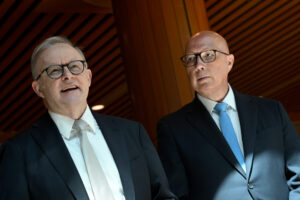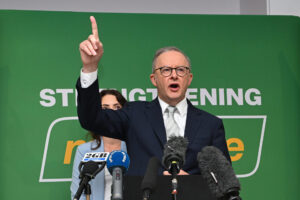There is a famous thought experiment, known as “the trolley problem”, that asks us to imagine ourselves driving a trolley – or a tram, for Australians – and having to choose between staying on the current track and running over five innocent people or switching tracks to kill only one person. You aren’t allowed to slam on the brakes or ding the bell, you have to choose. So, what would you do?
And so it is that some economists in Australia are trying to force a debate about whether we “should” let Covid-19 kill tens of thousands of people or ruin the economy and force millions of Australians into unemployment and poverty. What would you do? As a year 12 debating topic it would make for an interesting spar, but as a contribution to public policymaking in a pandemic it is juvenile.
The power of the trolley problem isn’t the choice of options, it’s the ability to force people to answer a hypothetical question. No parent falls for that trap: no parent will answer which of their kids’ lives they would save. Likewise, no one who is genuinely interested in helping to solve democratic problems would answer the question of whether it’s better to destroy tens of thousands of lives or hundreds of thousands of livelihoods.
The false binary has become the bane of modern democracy. Should we reduce greenhouse gas emissions or create jobs for the unemployed? Should we cut taxes on the rich and make the economy “competitive” or should we increase spending on health and education and ruin the economy; should Australia side with China or the United States? What is the right thing to do?
False binaries create the perfect stage for economists wielding a complicated economic model to perform on. Economic modelling allegedly allows us to objectively compare the “costs and benefits” of the two choices on the table and, in turn, allows our elected representatives to distance themselves from the subjective horror of deciding who to help and who to harm.
But despite the complicated mathematics upon which economic models are built, there is nothing objective about most of the key assumptions, especially when the models are used to answer questions about life, health and human misery. Any economist can put a value on human life to two decimal places, but that doesn’t mean that any two economists will agree.
Here are some of the subjective choices an economist needs to make when they are assessing the value of human life: Should men’s lives be valued higher than women’s, because men earn more, or lower, because women live longer? If “estimated time until death” is used to value the lives of people of different ages, should we value Indigenous lives at a lower level as First Nations people die, on average, at a younger age? Should the lives of those in Australia on a visa be valued at the same level as Australian citizens?
Those questions represent just the tip of the subjective iceberg that is “objective” economic analysis.
How do we value the physical pain and the fear of those who contract Covid-19 but don’t die from it, and the fear and exhaustion of the healthcare workers who are on the front line when we “let it rip”? How should we value the anxiety caused by the ambulance sirens that blared all through the night at the peak of New York’s Covid-19 crisis? Or the anguish of families whose loved ones were buried in a mass grave?
Putting a value on loss of life is hard enough, but putting a value on trauma, depression and PTSD is so far beyond the scope of the simple economic analysis that dominates public debate. And so, such anguish is simply ignored and, in turn, implicitly valued at zero. Resilience, at a personal and community level, is – like intensive care beds, hand sanitiser and toilet paper – a scarce resource that can be used up rapidly in a pandemic. There is nothing irrational about wanting to avoid the horror that New York and Florida have gone through.
Never forget that those who are claiming it is “better” for tens of thousands to lose their lives than for hundreds of thousands to lose their jobs are claiming to have factored in all the costs and all the benefits of both sides of the false binary. If they really believe they have objectively calculated all the values of all the forms of human misery, they should release them for public scrutiny.
But it’s not only economists’ inability to measure the things that matter that is a problem, it’s our inability to imagine problems and solutions outside binary choices. Economics was branded “the dismal science” after Thomas Malthus famously predicted that because the population would always grow faster than the amount of available agricultural land, humans were destined to live in “misery and vice”.
Needless to say, Malthus assumed that no technological advances in agriculture were possible. Economic models developed in the 1980s had no mobile phones in them, economic models developed in the 1990s involved no internet, and many of the economic models that are used to claim we “can’t afford” to phase out coal-fired power stations literally assume that we can’t close down coal-fired power stations. As the old modelling adage goes: garbage in, garbage out.
False binaries force phoney debates about brutal choices while also stifling public debate about creative solutions.
Politicians turn to economists for answers to questions they are elected to answer: whether it’s about cutting taxes, spending more on aged care, stopping koalas going extinct or letting property developers keep building housing estates, the instinct is always, “let’s get some modelling”. Whenever someone proposes to help the environment, or the vulnerable, an economist appears to tell us we shouldn’t bother.
But perhaps those proud “economic rationalists” raging against efforts to stop a pandemic have done the rest of us a favour. Not only is the claim that it is “better” to let the virus rip than to save tens of thousands of lives under-researched, it is clearly an outrageous case of disciplinary overreach. Epidemiologists, virologists and public health experts who have spent their lives planning for, and fighting against, infectious disease are being patronised by a handful of contrarians – and the public, and the politicians, clearly don’t like it.
Perhaps more importantly, what the “let it rip” economists don’t seem to realise is that we don’t usually ask economists important questions.
Imagine that rather than epidemiologists warning that tens of thousands might die from Covid-19, a warning came from ASIO after it intercepted phone calls between suspected terrorists talking about sophisticated plans to blow up dozens of planes. Would anyone call an economist?
Imagine if a foreign country landed troops west of Broome, annexed 10,000 square kilometres and declared the territory to be theirs. Some economists counsel against an expensive war on the basis that, although the land was deemed to be of enormous cultural significance to the local Indigenous populations, it had little in the way of commercial tourism or mining value. Would anyone listen?
It has never been true that economists run the country. If economic growth was the be-all and end-all, conservative governments would be desperate to offer free childcare to encourage hundreds of thousands of women to renew the labour market, and they would be desperate to tax the churches and the mining companies and spend the money investing in education and science. And, of course, the clearest evidence that economics has virtually no influence over politicians is Australia’s lack of a carbon price. Virtually every economist agrees a carbon price is a good idea and yet both major political parties are adamant that such a policy would harm the economy.
Economics and economic modelling sometimes play an important role informing some policy decisions that affect people. There’s no doubt that if you want to make a case to cut welfare for the poor, cut taxes for the rich or frack for gas on fertile farmland, economists are the first port of call for those trying to dress up personal interest as national interest. But when economists urge governments to introduce a carbon tax or a mining super profits tax, to provide free childcare or to increase unemployment benefits, they get dismissed as “ivory-tower elites” who don’t understand how business works.
Economists aren’t powerful, it’s just that they seem powerful when they are speaking on the side of power. But those arguing we should let this pandemic kill a lot of older wealthier people in order to save the jobs of younger generations have not only stumbled into the limits of economic modelling but also the limits of the power of economists to influence debate.
Between the Lines Newsletter
The biggest stories and the best analysis from the team at the Australia Institute, delivered to your inbox every fortnight.
You might also like
Private health insurance is for the rich – the rest would rather better public health
ATO figures show that private health insurance is favoured by the rich and it should be subject to GST
5 ways and 63 billion reasons to improve Australia’s tax system
With a federal election just around the corner, new analysis from The Australia Institute reveals 63 billion reasons why our next Parliament should improve the nation’s tax system.
Business groups want the government to overhaul the tax system? Excellent – we have some ideas.
The landslide win by the ALP has seen business groups come out demanding the government listen to their demands despite having provided them no support, and plenty of opposition, over the past 3 years.


